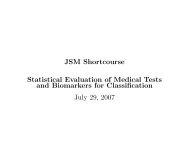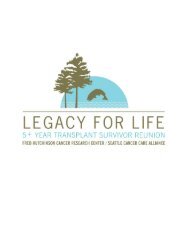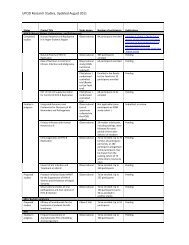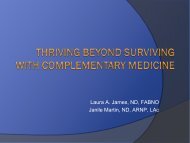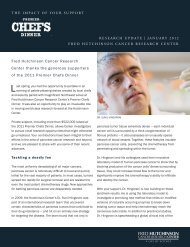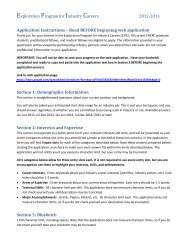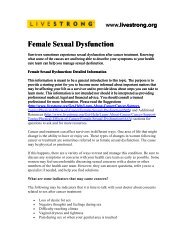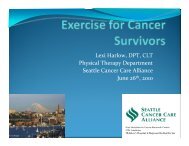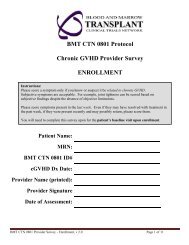Summer Undergraduate Research Program - Fred Hutchinson ...
Summer Undergraduate Research Program - Fred Hutchinson ...
Summer Undergraduate Research Program - Fred Hutchinson ...
You also want an ePaper? Increase the reach of your titles
YUMPU automatically turns print PDFs into web optimized ePapers that Google loves.
Graduate School Personal Statement #4<br />
If nothing else, my undergraduate experience has taught me that failures will almost always<br />
precede successes. Academically I’ve crashed midterms before acing finals. Athletically I’ve lost<br />
scrimmages against schools I hadn’t known existed before winning a national title against the best‐<br />
ranked team in the country. In research I’ve broken gels, mislabeled tubes, forgotten to feed cells fresh<br />
media, and mixed up PCR primers, all in route to finding meaningful results. To paraphrase, I’ve learned<br />
the lesson of “try, try again” quite thoroughly and, in the process, discovered a deep personal store of<br />
perseverance that is especially well‐suited to an aspiring scientist.<br />
Completing my undergraduate bioengineering degree in the Collegee of Engineering at XXX has<br />
equipped me with a strong quantitative reference frame with which to approach scientific questions.<br />
Core bioengineering courses such as Stem Cell Technology, Cell and Tissue Engineering, and BioMEMS<br />
(Biological Microelectromechanical Systems) underline the value of using first principles to understand<br />
complicated cellular processes and rational design to successfully intervene when they founder. I have<br />
also completed molecular and cell biology courses to supplement my understanding of basic eukaryotic<br />
biology. Tumor Biology, Systems Biology, and Molecular Immunology especially captured my interest in<br />
the molecular machines and precise interactions which govern either protection from or entry into<br />
disease states. A marriage of academic experience in engineering and biological science uniquely<br />
qualifies me to contribute to innovative biomedical research at the graduate level.<br />
Compelled to start sooner rather than later, I have participated in both basic science and<br />
translational research projects as an undergraduate. As a member of XXX’s laboratory in the<br />
bioengineering department at XXX, I focused primarily on trying to understand and predict protein<br />
folding, particularly in relation to aggregation phenomena. Many neurodegenerative diseases, including<br />
Alzheimer’s, Huntington’s, and Parkinson’s disease, are characterized by mistimed aggregation in β‐rich<br />
proteins, so I set out to understand if increased propensity for aggregation is exclusively restricted to<br />
disease states or rather a general property of all β‐rich proteins. Working with postdoctoral researcher<br />
XXX (now a senior biochemist at XXX Laboratories), I performed dynamic protein folding simulations and<br />
in vitro kinetic experiments to characterize the tendency of a β‐rich but non‐disease related protein to<br />
aggregate under various conditions. However, even under favorable conditions, I found aggregation in<br />
the non‐disease protein to be extremely fragile and rare. These results indicated that, unlike in disease<br />
state conformations, wildtype β‐rich proteins are protected from aggregating. Dr. XXX, Professor XXX,<br />
and I have submitted a publication describing our findings to which I contributed experimental design,<br />
execution, data analysis, figure generation, and original text. My experience in the XXX laboratory was<br />
particularly valuable because it provided me with my first opportunity to conduct independent<br />
investigation and to participate in the publication phase of scientific research.<br />
In addition to research in the bioengineering department at XXX, I spent the recent summer<br />
working as a research intern in XXX’s laboratory at the XXX in XXX. While there I was mentored by<br />
research associate XXX and contributed to a drug delivery project in which we characterized the<br />
specificity and efficacy of a novel vehicle called the “polyplex.” The polyplex uses RNA interference to<br />
help overcome a major problem in conventional cancer treatment, which is the innate resistance many<br />
cancers have to chemotherapy. We hypothesized that delivering pro‐apoptotic small interfering RNA<br />
(siRNA) to cancer cells would help sensitize those cells and potentially allow loser‐dose chemotherapies<br />
to be prescribed in the clinic with equal therapeutic benefit. My involvement entailed performing assays<br />
to quantify drug uptake, target RNA transcript knockdown, and cytotoxicity in human breast and ovarian<br />
cancer cell lines. I found that the polyplex successfully delivers siRNA into the cytosol of cells expressing<br />
targeted surface receptors and, furthermore, initiates degradation of sequence‐specific RNA transcripts<br />
without a widespread effect on gene expression. At the conclusion of the summer program I presented<br />
my results in both a XXX laboratory meeting and a competitive poster symposium at the XXX, where I<br />
was awarded “XXX” by a panel of graduate and postdoctoral researchers.<br />
30




